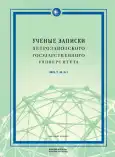RECEPTION OF ANTIQUITY IN RUSSIAN LITERATURE OF THE FIRST THIRD OF THE XIX CENTURY (the study of the Norhern Flowers almanac)
- Autores: Kolokolova O.A.1
-
Afiliações:
- Karelian Research Centre of the Russian Academy of Sciences
- Edição: Volume 46, Nº 1 (2024)
- Páginas: 66-75
- Seção: Articles
- URL: https://bakhtiniada.ru/2542-1077/article/view/293257
- DOI: https://doi.org/10.15393/uchz.art.2024.993
- ID: 293257
Citar
Texto integral
Resumo
In the first third of the XIX century, the role of the periodicals in the development of Russian literatureincreased. Northern Flowers is one of the most authoritative and long-lived almanacs, edited by Anton Delvig (1825–1831) and Alexander Pushkin (1832). The authors and editors had common views on aesthetics and shared interest in harmonic antiquity, plastic arts, and categories of philosophy and culture. This is the first time the study of antique reminiscences is conducted using the materials of all issues of the Northern Flowers almanac as a single complex oftexts. The method of content analysis makes it possible to highlight specific cases of reception and review of the ancienttradition and to identify the most regular reminiscences according to the statistical data. The following issues are considered:the reception of antiquity in critical literature; theoretical questions of translation; publication of translations ofancient authors’ texts; references to and direct citations of ancient authors; reception of ancient genres; and images of plastic art and mythology. The study revealed that the ancient theme was not only a means of stylization and providing aesthetic value for literary texts. The reception of classical art forms served as the basis for the development of ideas of Russian national literature.
Palavras-chave
Sobre autores
O. Kolokolova
Karelian Research Centre of the Russian Academy of Sciences
Autor responsável pela correspondência
Email: kolokolowa.olg@yandex.ru
Cand. Sc. (Philology)
Bibliografia
- Vatsuro, V. E. Delvig and art. In: Vatsuro, V. E. Commentator’s notes. St. Petersburg, 1994. P. 172–202. (In Russ.)
- Vatsuro, V. E. Northern Flowers. The history of Delvig and Pushkin’s almanac. In: Vatsuro, V. E. Selected works. Moscow, 2004. P. 3–222. (In Russ.)
- Egonov, A. N. Homer in Russian translations of the XVIII–XIX centuries. Moscow, 2001. 397 p. (In Russ.)
- Kibalnik, S. A. Russian anthological poetry of the first third of the XIX century. Leningrad, 1990. 267 p. (In Russ.)
- Classicism and neoclassicism in Russian literature of the XVIII–XIX centuries: Collected papers. Issues 1, 2. Petrozavodsk, 2011–2012. (In Russ.)
- Knabe, G. S. Pushkin and ancient literature. In: Pushkin. Studies and materials: Pushkin and world literature. Materials for the Pushkin Encyclopedia. St. Petersburg, 2004. Vol. XVIII–XIX. P. 24–31. (In Russ.)
- Litinskaya, E. P. Review and reception of ancient literature in Vasily Zhukovsky’s works. Petrozavodsk, 2011. 311 p. (In Russ.)
- Litinskaya, E. P. Greek anthology in the journal Sovremennik (1836–1866). Proceedings of Petrozavodsk State University. 2023; 45(7): 71–79. doi: 10.15393/uchz.art.2023.960 (In Russ.)
- Malchukova, T. G. Ancient traditions in Russian poetry. Petrozavodsk, 1990. 103 p. (In Russ.)
- Malchukova, T. G. Genre traditions in Pushkin’s “Anthological Epigrams”. In: Genre and composition of literary works. Petrozavodsk, 1986. P. 64–82. (In Russ.)
- Manina, I. O. Ancient theme in the magazine Bulletin of Europe (1802, Nos. 1–12). In: Intersections of interactions: The dialogue between Russian and foreign literatures. Proceedings of the 8th International Scientific Readings. Kaluga, 2022. P. 74–86. (In Russ.)
- Nilova, A. Yu. Genre and stylistic traditions in Mikhail Lermontov’s lyric poetry (epistle, elegy). Petrozavodsk, 2009. 169 p. (In Russ.)
- Nilova, A. Yu. Ancient traditions in Mikhail Lermontov’s lyrics. Petrozavodsk, 2016. (In Russ.)
- Patroeva, N. V. Antique images in Yevgeny Baratynsky’s book of poems “Twilight”. In: Russia and Greece: Dialogues of cultures: Proceedings of the V International Conference. Petrozavodsk, 2020. P. 127–135. (In Russ.)
- Reception of ancient heritage in Russian literature of the XVIII–XIX centuries: Collected papers. Petrozavodsk, 2009. 272 p. (In Russ.)
- Savelyeva, L. I. Classical antiquity in Russian poetry of the late XVIII – early XIX centuries. Kazan, 1980. 120 p. (In Russ.)
- Savelyeva, L. I. Classical antiquity in Russian romantic poetry (Poets of Pushkin’s circle). Kazan, 1986. 77 p. (In Russ.)
- Sviyasov, E. V. Sappho and Russian love poetry of the XVIII – early XX centuries. St. Petersburg, 2003. 397 p. (In Russ.)
- Dictionary of antiquity / Ed. V. I. Kuzishchin et al. Moscow, 1989. 704 p. (In Russ.)
- Skoropadskaya, A. A. Review of antiquity on the pages of Russian literary journals of the early XIX century. In: National and cultural codes of world literature in the context of audiovisual art practices. Nizhny Novgorod, 2022. P. 232–239. (In Russ.)
- Suvorova, I. M., Skoropadskaya, A. A. Antique reminiscences in Russian poetry of the early XIX century (based on the materials of the “Muses Scroll” almanac). The Problems of Historical Poetics. 2022; 20(4): 112–128. doi: 10.15393/j9.art.2022.11623 (In Russ.)
- Takho-Godi, A. A. Aesthetic and life meaning of Pushkin’s ancient symbols. In: The writer and life. Collection of historical, literary, theoretical, and critical articles. Moscow, 1986. Issue 5. P. 102–120. (In Russ.)
- Fridlender, G. M. Batyushkov and antiquity. Russkaya Literatura. 1988; 1: 44–49. (In Russ.)
- Frizman, L. G. Alexander Pushkin and Northern Flowers. In: Northern Flowers almanac for 1832. Moscow, 1980. P. 295–337. (In Russ.)
Arquivos suplementares








